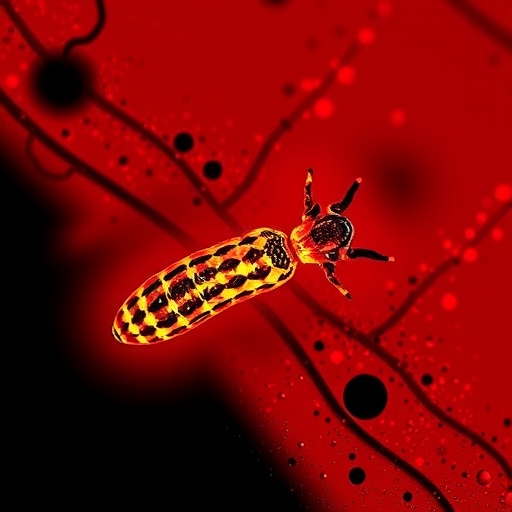In a groundbreaking study addressing the spatial ecology of Trypanosoma cruzi, the parasite responsible for Chagas disease, researchers have investigated its dynamics within human-modified landscapes. This study, executed by Chan-Espinoza, Rodriguez, and Canché-Pool, offers comprehensive insights into how these landscapes influence the metapopulation structure of the pathogen. The intricate interplay between environmental factors and the organism’s spatial distribution sheds light on a critical aspect of biodiversity in the context of human encroachment on natural ecosystems.
The implications of this research extend far beyond academic curiosity; as urbanization and agricultural expansion alter habitats worldwide, understanding how T. cruzi thrives in these environments becomes imperative. The study delineates how human activities such as deforestation and land conversion not only impact native wildlife but also create new niches that may be exploited by disease vectors. This underscores the connection between ecological changes and public health, likely placing this research at the forefront of zoonotic disease studies.
Researchers employed a metapopulation perspective to examine how local populations of T. cruzi interact, disperse, and survive within fragmented landscapes. The chosen approach allows for a nuanced understanding of the spatial dynamics that characterizes these landscapes, demonstrating how human actions trigger changes in the distribution patterns of the parasite. The findings suggest that the metapopulation model could provide new frameworks for predicting disease transmission risk in modified environments.
An important aspect of the study involves the identification of key environmental variables that influence the persistence of T. cruzi across different landscapes. By analyzing various human-altered ecosystems, researchers observed how certain factors, such as land use, vegetation types, and climate conditions, interact to create favorable environments for the parasite. This ecological knowledge paves the way for targeted interventions in managing both the parasite and its vectors.
The study highlights the significance of understanding the role of ecological corridors in enhancing connectivity among T. cruzi populations. These corridors can facilitate the movement of vectors, which in turn increases the likelihood of disease transmission between hosts. The researchers emphasize that maintaining such ecological connectivity can be pivotal for both controlling parasite spread and promoting biodiversity conservation.
In addition to traditional ecological methods, the research utilizes advanced modeling techniques to predict potential scenarios regarding the future of T. cruzi in rapidly changing environments. This predictive modeling is essential for anticipating how the parasite may adapt to ongoing changes and for developing effective management strategies. It is critical to remain proactive in addressing the potential emergence of Chagas disease in new regions influenced by land use changes.
Further, the authors underscore the necessity of a holistic approach to public health that integrates ecological research with socioeconomic factors. Such interdisciplinary frameworks are vital for understanding the broader impacts of human development on parasitic diseases, particularly in light of the increasing urbanization of previously rural areas. Engaging diverse stakeholders, including ecologists, epidemiologists, and policymakers, is essential for developing effective, context-specific interventions.
The research conducted by Chan-Espinoza and colleagues contributes significantly to our understanding of the complex interactions between parasites and their environments in a human-dominated world. The metapopulation perspective remains a powerful tool for addressing ecological and public health challenges, revealing how parasites can persist and thrive amidst habitat fragmentation and alteration.
Ultimately, the findings underscore the need for ongoing research into the consequences of anthropogenic changes on disease ecology. As landscapes continue to evolve, understanding how T. cruzi and other pathogens respond will be crucial for mitigating their impact on human health and biodiversity. This innovative study not only advances our scientific knowledge but also serves as a call to action for further investigations that intertwine ecology, health, and policy.
The implications of this research seem promising not only for controlling T. cruzi but also for enhancing our approach to managing ecosystems in which human and wildlife health are interconnected. As we reflect on these findings, it becomes increasingly clear that preserving ecological integrity can be a substantial ally in the fight against emerging infectious diseases.
The intricate nature of this research illustrates how ecological changes can lead to unforeseen consequences for human health. The promising data provided in this study serve as a reminder of the importance of interdisciplinary collaborations. Future studies should expand upon these findings by including more variable landscape types and examining the potential influence of climate change on T. cruzi distribution.
As the world grapples with the challenges posed by both infectious diseases and biodiversity loss, this pioneering work sets a precedent for future inquiries into the spatial dynamics of pathogens and their vectors in ecologically altered environments.
We look forward to seeing how these insights will contribute to the development of effective management strategies that prioritize both human health and the preservation of ecological systems. The ongoing dialogue between specialists in ecology, epidemiology, and urban planning will be crucial for addressing the challenges posed by the overlapping crises of infectious disease emergence and environmental degradation.
Given the growing concern over zoonotic diseases, studies such as this are not only timely but essential. By illuminating the hidden connections between ecological health and disease emergence, we can better prepare ourselves to face the complex challenges posed by a rapidly changing world.
Subject of Research: Spatial ecology of Trypanosoma cruzi in human-modified landscapes.
Article Title: The spatial ecology of Trypanosoma cruzi in human-modified landscapes from a metapopulation perspective.
Article References:
Chan-Espinoza, D., Rodriguez, A., Canché-Pool, E.B. et al. The spatial ecology of Trypanosoma cruzi in human-modified landscapes from a metapopulation perspective. Discov Anim 2, 85 (2025). https://doi.org/10.1007/s44338-025-00140-4
Image Credits: AI Generated
DOI:
Keywords: Trypanosoma cruzi, spatial ecology, metapopulation, human-modified landscapes, Chagas disease, biodiversity, disease transmission, ecological corridors.




